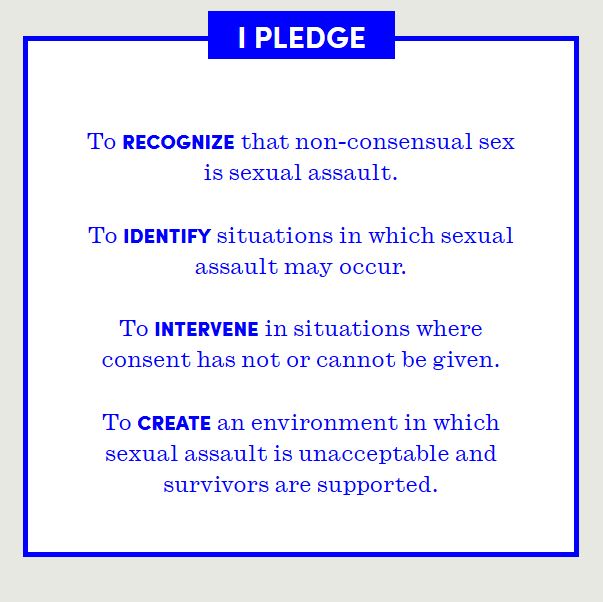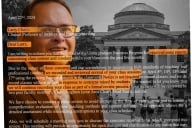You have /5 articles left.
Sign up for a free account or log in.
WASHINGTON -- The White House launched a major public awareness campaign about campus sexual assault on Friday -- the aim of which, President Obama said, is no less than to "fundamentally shift" how the country thinks about campus sexual assault.
"We are going to organize campus by campus, city by city, state by state," Obama said. "This entire country is going to understand what this is about, and we're going to put a stop to it."
The campaign, called "It's on Us," encourages student bystanders to intervene when they see situations that could lead to sexual assault, as well as attempts to change harmful attitudes that young men may have about women and sex. The breadth of the campaign is expansive, with the White House enlisting support from Hollywood, Washington, and campuses across the country. But some sexual assault advocates worry that altering cultural norms to such a degree will be a taller order than the campaign can fill, and that it could divert attention from more policy-driven prevention efforts.
Actors like Jon Hamm, Connie Britton, and Kerry Washington lent their voices to slickly-produced PSAs. Media partners include entertainment juggernaut Viacom, video game publisher Electronic Arts, and Millennial-focused TV station Pivot. The National Collegiate Athletic Association will offer resources on its website and play PSAs on stadium video screens during championship events.
Other corporate sponsors include College Humor, Newsweek, Tumblr, Microsoft, Clear Channel, and SB Nation. Some of the companies switched out their Twitter avatars for the campaign's logo on Friday.
 More than 200 student body presidents signed the White House’s “It’s On Us” pledge, which states that a student will recognize that nonconsensual sex is sexual assault, identify situations where assaults could happen, intervene in situations where consent has not been or cannot be given, and create an environment in which sexual assault is unacceptable. NASPA: Student Affairs Administrators in Higher Education announced its support of the program, and urged student leaders to sign its own version of the pledge as well. The Rape, Abuse and Incest National Network is also a partner.
More than 200 student body presidents signed the White House’s “It’s On Us” pledge, which states that a student will recognize that nonconsensual sex is sexual assault, identify situations where assaults could happen, intervene in situations where consent has not been or cannot be given, and create an environment in which sexual assault is unacceptable. NASPA: Student Affairs Administrators in Higher Education announced its support of the program, and urged student leaders to sign its own version of the pledge as well. The Rape, Abuse and Incest National Network is also a partner.
Lisa Maatz, vice president of government relations at the American Association of University Women, said that the AAUW partnered with the White House precisely because of the scope of the campaign and its partners.
“We were impressed by the diversity of this membership,” Maatz said. “It moves beyond the victims’ rights groups and the women’s rights groups to include the gaming industry, professional sports leagues, and celebrities. You need that to create the kind of cultural change we’re talking about.”
During an event launching the campaign on Friday, Vice President Joe Biden said that the burden for raising awareness about campus sexual assault has been strictly on the shoulders of activists for too long, and that it's time for people of all kinds to intervene and condemn sexual violence. “Violence against women is not a women’s issue alone,” Biden said. “It’s a man’s issue.”
At the event, Neil Irvin, executive director of Men Can Stop Rape, urged parents to help boys learn about a different kind of masculinity. Young boys are often taught to “disconnect from their emotional intelligence,” Irvin said. He said boys are taught not to cry, show love, or know empathy.
“Now those boys are 18 years old and in relationships with our family members and they have no idea how to deal with this,” Irvin said. “Don’t be surprised when this happens, because this violence is coming from how we teach boys to be men. It's coming from the minute we painted their room blue.”
While changing ideas about how men should treat women will be a key part of the cultural shift the White House is aiming for, the campaign is also largely focused on encouraging more bystander intervention from both men and women. To help with the effort, the U.S. Department of Justice will provide $6 million to sexual assault prevention programs at 18 colleges. The White House will release three new documents detailing “best practices" through the campaign's website.
Steven Knapp, president of George Washington University, said the campaign is a welcome “shift in direction” for the administration, which has so far focused its energies on the legal requirements colleges must meet when dealing with campus sexual assault.
“I think what the president made clear was that after several years of trying to inform colleges and universities of their legal responsibilities and the polices that govern this area, he’s now addressing the underlying culture,” Knapp said. “I think that turn from policy to culture is a very important next step in this process. You can't do this without the focus on justice, but you also can't do this without the focus on culture."
Dana Bolger, the founding co-director of Know Your Title IX, said she worries that the administration is moving onto the "next step" before finishing the previous one. While the U.S. Department of Education’s Office for Civil Rights is still investigating nearly 80 colleges and universities for how they handle sexual assault investigations, Bolger said the federal government has not done a good enough job sanctioning institutions.
Colleges, she said, are still letting rapists off the hook, and the federal government is still letting off colleges with a slap on the wrist.
“I think an important part of prevention always is enforcement,” Bulger said. “Sometimes I think we paint cultural change as different from enforcement. If schools were punishing perpetrators with more than book report, I think we would start to a see a cultural change more quickly. Bystander prevention can’t be a substitute for real enforcement.”
Some critics also wonder how much a public awareness campaign -- even one as large as "It's On Us" -- can actually transform a culture. What happens when the campaign ends, and the PSAs are no longer running on MTV? Senator Claire McCaskill offered her support for the campaign, but also urged the passing of legislation she helped author, saying that "change doesn't happen quickly." The bill, sponsored by a bipartisan group of 8 senators led by McCaskill, aims to hold colleges more accountable for preventing and dealing with campus sexual assault.
John Foubert, president of sexual assault prevention program One in Four, said he was cautiously optimistic about the campaign. Changing a longstanding culture of male violence will be a particular challenge for "It's On Us," he said, but it could get the ball rolling in the right direction.
"Honestly, the campaign can only be so successful," Foubert said. "I think the success of it will be determined by how many new individuals sign on to this. If it is just your campus coordinator and people in peer education groups taking the pledge and clicking a button on a website, then that's pretty limited. But if there ends up being a more widespread buy-in, then change could become possible."








